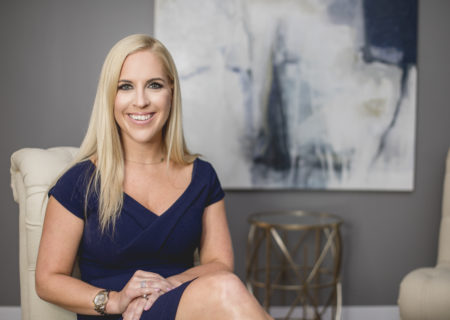Lawyer Holly Davis offers insight for women questioning whether merging finances with a partner is the right decision.
By Sommer Brugal, Photo by Andrew Bennett
 Holly Davis is a divorce lawyer, and while she admits her profession isn’t the easiest thing to discuss at a cocktail party, Davis says she’s incredibly proud of her work.
Holly Davis is a divorce lawyer, and while she admits her profession isn’t the easiest thing to discuss at a cocktail party, Davis says she’s incredibly proud of her work.
As a founding partner of Kirker Davis LLP, Davis has a mission is to help people understand divorce, quite possibly so they never have to go through it. She also works to educate her clients about the financial aspects of a legal partnership before, during and, if the occasion arises, after a marriage.
Given Davis’ expertise and her astute boss-lady attitude, Austin Woman asked her how two people can strategically—and fairly—keep their finances separate or merge them into one account. Here’s what she had to say.
Get to know your partner.
Communication is key to successfully managing finances as a couple, Davis says. While she notes it’s “not the sexiest part about falling in love with someone,” Davis believes transparency in finances plays a major role in healthy relationships.
“When you’re talking to this person you really get along with about their family, if they want children, what their five-year plan is, it makes so much sense [to discuss finances],” Davis explains.
She says expressing desires to own real estate or explaining one’s conservative spending habits is important to understand before merging assets.
“The more [you communicate]with someone early on, the more you can get to know them and problem-solve if there are differences,” she says, adding it’s never too early to discuss money matters.
Should you merge or separate your finances?
According to Davis, deciding to merge or keep one’s finances separate ultimately depends on a couple’s goals. However, if one individual enters a marriage with a significant amount of money, or money he or she wants to preserve later on, Davis does suggest keeping that money separate unless, however, that individual has a specific goal in mind, like buying a home.
“If you want to build a home and you decide, ‘I really want to use this money to build my dream home,’ then that would be an OK time to mingle [your finances]because you’ve thought about it,” she says.
One thing Davis does not suggest is couples taking the money they had prior to marriage and putting it into a single account from the start. She reasons preserving the money one has prior to marriage is very difficult to do once it’s been mingled with a spouse’s, especially in Texas, which is a community-property state.
One compromise Davis recommends is what she calls a household account. Establishing an account into which both parties contribute a percentage of their income to ensure finances like the mortgage, utilities and even kids’ expenses are met enables each individual to also maintain the savings they had prior to marriage.
Discuss what’s best for you.
Financial conversations can often be emotionally charged. That’s why Davis suggests having an interest-based conversation instead, one focused on the motivation behind a request instead of the request itself.
“If we consider your partner is wanting access to your finances because he or she wants to make a monthly budget,” Davis says, “then I suggest [addressing]it on the monthly budget.”
Davis proposes sitting down with your home’s list of bills and having each partner pick which service he or she will be responsible for. Davis says this process allows couples to maintain separate finances while the interests and desires of both are met.
She also suggests engaging in such conversations with a financial planner.
Ask questions.
While Davis aims to educate all individuals about divorce and the challenges of finances, she hopes she can encourage women to speak up during these conversations.
“Unfortunately, I find the stereotype is that men drive conversations about finances, but it really should be women,” she says. “[Women] are affected by [finances], and there’s nothing wrong with demanding such information.”
Davis encourages women to ask questions, research phrases they may not understand and to stand up for their right to know the specifics of their family’s finances.

